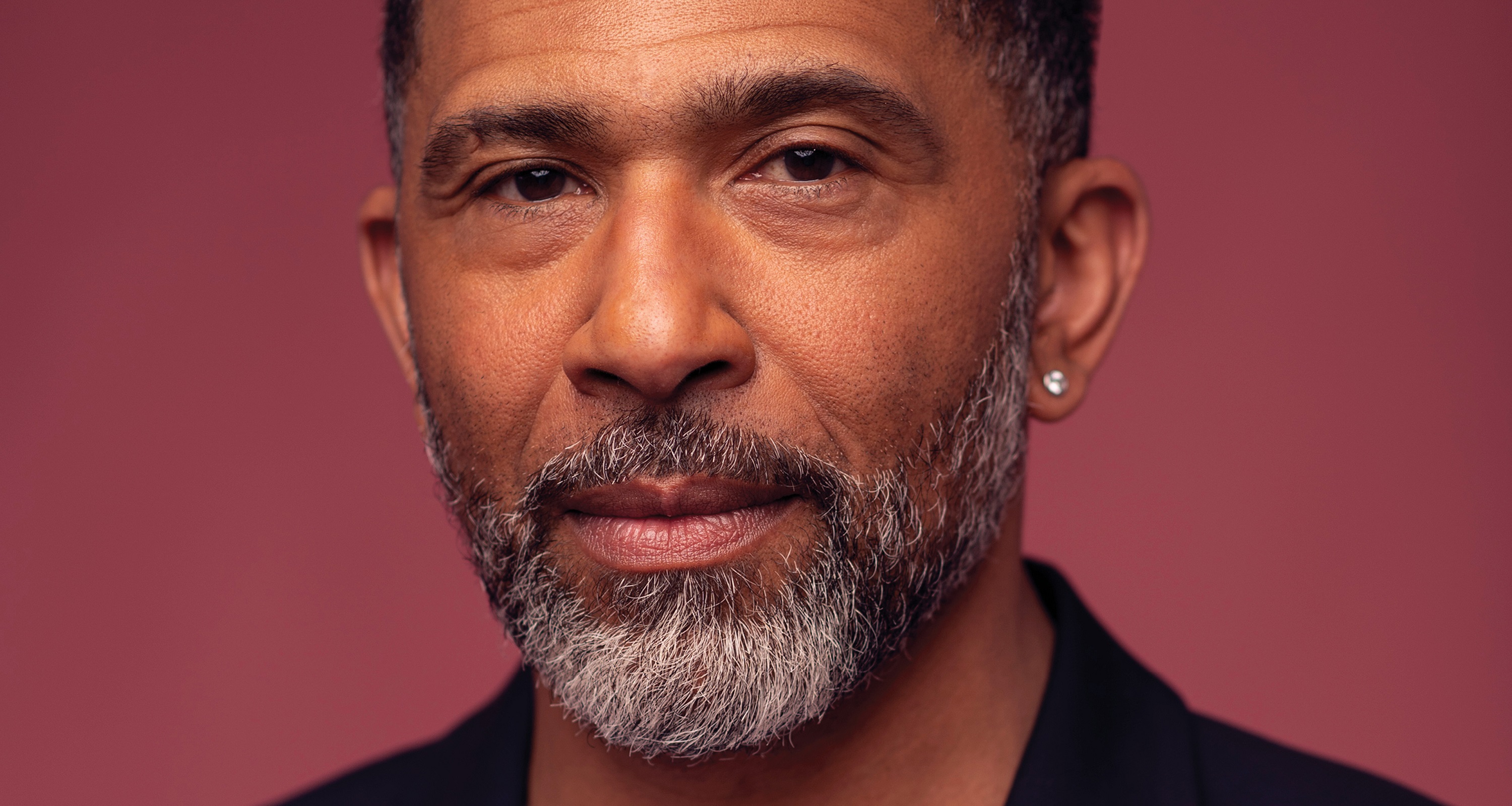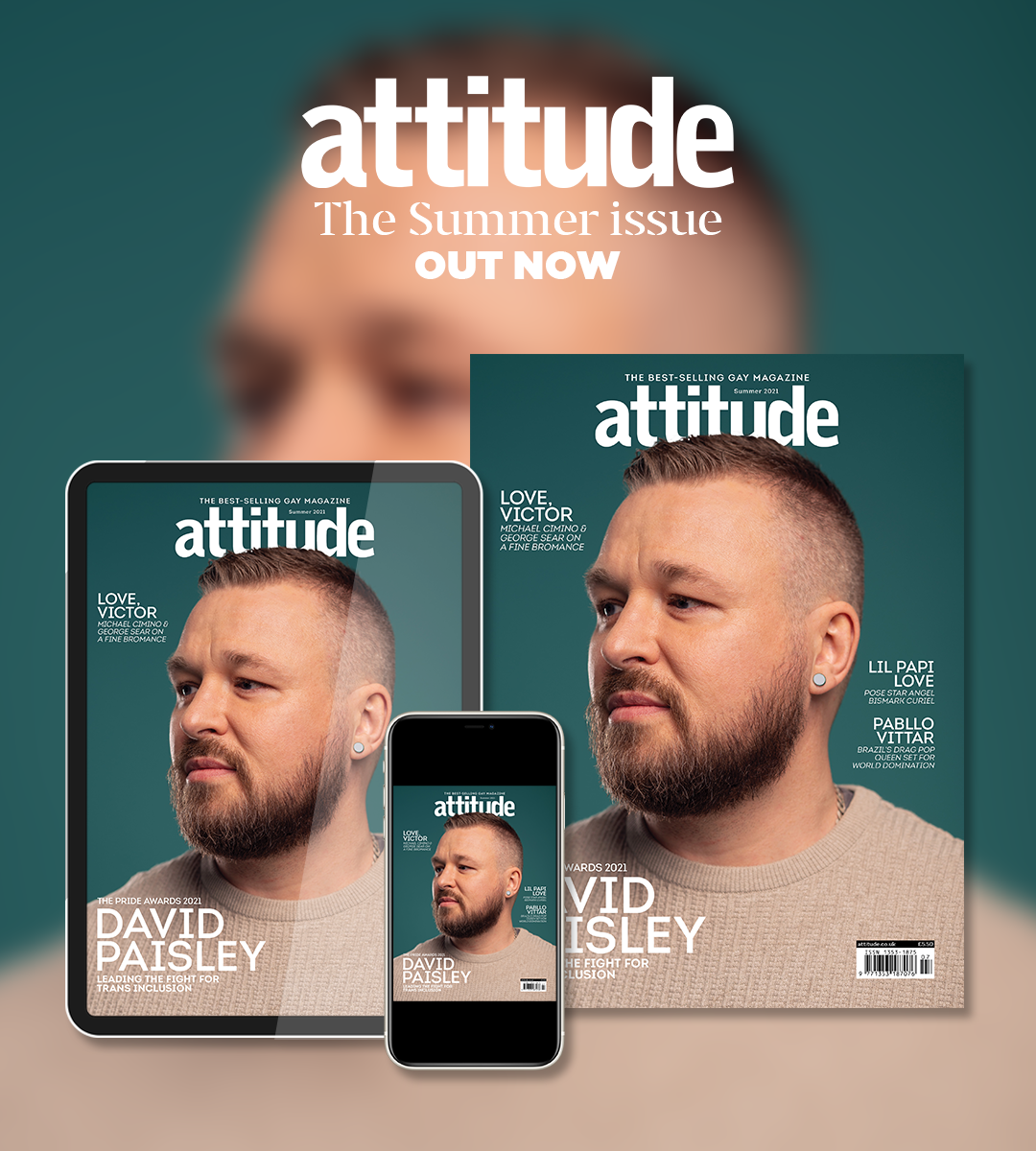Diagnosed with HIV at 17, Marc Thompson has been stamping out stigma ever since
The Prepster co-founder is one of 10 everyday LGBTQ heroes honoured at the Attitude Pride Awards 2021, supported by Clifford Chance.

Interview: Cliff Joannou; pictures: Markus Bidaux
The Attitude Pride Awards, supported by Clifford Chance, are part of Attitude Pride at Home, in association with Klarna.
Growing up in a small African-Caribbean family in Brixton, south London, Marc Thompson paints a picture of a wonderful childhood. “My parents were really warm and loving, they provided me and my sister with an incredibly safe environment. I was a joyful, happy kid.”
His coming out was relatively smooth, sharing his sexuality with his head of year Mrs Martin when he was 15 years old. “I was down and depressed and unhappy. She was so supportive, and gave me numbers for the Lesbian & Gay Switchboard and a local gay group. That was just really helpful,” says Marc.
“I started to explore, discover myself”
Despite attending a “pretty rough” all-boys comprehensive, he opened up to friends, who were “lovely and accepting… they were cool. I started to explore, discover myself.” He had his first boyfriend at 16. “As a young Black gay man, I was really lucky and fortunate that I found my tribe, and other Black gay men and a Black gay community.
“I went to lots of Black gay house parties, which were really cool, safe spaces.”
Sadly, his joy was short-lived when he was unexpectedly diagnosed with HIV in November 1986. “I’d not long turned 17. And the HTLV-III test, which eventually became the HIV test, had just become available, and my friends were going for the test. I just thought it was the right thing to do, that I’m not going to be positive.
“So, I went along to get a test and was shocked and blown away.
“I’d only had a couple of partners. I didn’t think that HIV was part of my world. I was devastated. I remember feeling like a wall descended upon me. Those first few days and weeks were incredibly dark, upsetting and lonely.
“In those first few years, I’m not sure if I did come to terms with my diagnosis,” he says. Seeking support from local services and other positive people that he could find slowly started him on the long journey towards acceptance.
“My mental health was put through the wringer”
Fortunately, Marc was never hospitalised from having HIV, and only occasionally experienced thrush, mouth ulcers, or flu. The worst thing were the night sweats, when he would wake in the middle of the night soaked through. He worried constantly that something would happen to him.

“My mental health really suffered, I can’t underplay that at all. Physically, I was OK, but my mental health was put through the wringer. I was dealing with anger, depression, moods.”
As the Aids epidemic continued to take hold, regular, horrific, anti-gay headlines appeared in the media and, into the 1990s, more and more people were dying. The introduction of Clause 28 ramped up homophobia, and a feeling among gay men that the world wasn’t a safe space for them.
“This is a time when there was high racism in the country. So the intersection of my gayness, my Blackness and my HIV made the world feel really dark, made it feel like there were attacks on me.”
“I never considered myself an activist”
Eventually, those experiences started to converge to give him the strength to stand tall. “There was a moment in the early-mid ’90s, where I started to find other Black gay men who wanted to make a difference. I felt safe, welcomed to talk about my HIV. I felt family with them.
“And that’s when I realised that these three things in my life were really important, they happen to lots of people like me, and I should use them. They were weapons that I could turn around and use to do good.
“It happened organically. But one thing I was really clear about was that I never considered myself an activist. When I went to tell other Black gay men about safer sex and avoiding HIV risks, it was simply because I didn’t want anybody to experience the stigma, shame and hurt that I had felt.
“I wanted to make the world a bit safer and nicer for men that might have the same experiences as me.” He volunteered for Black gay men’s discussion group Let’s Rap, and in 1995 worked with Big Up, the first organisation in the country to address the sexual health and HIV needs of Black gay men.

“We were shouting at politicians, funders, commissioners…”
His work challenging HIV stigma and giving voice to positive men continued into the 2000s. Then, in around 2012, Marc and his colleague Will Nutland recognised that gay men’s sexual health in the UK needed a drastic shake-up.
Around the same time, the effectiveness of PrEP [pre-exposure prophylaxis, a highly effective drug that prevents HIV] was being made available, and doctors appealed to Marc and Will to help raise awareness. In response, along with other colleagues, they founded Prepster, aiming to “educate and agitate” for PrEP access in England.
“We were shouting at politicians, funders, commissioners that they should make this new drug available, because this is the way we’re going to start to cut HIV transmission,” says Marc.
Alongside Prepster, Marc and Will launched The Love Tank, a community interest company addressing the needs of the marginalized and vulnerable — queers, people of colour, trans people, sex workers — to address health inequalities.
“I’ve done all this just by being Marc, a regular boy from Brixton”
Most recently, Marc has embraced his youthful roots with the Instagram page Black and Gay Back in the Day. “I’d seen It’s a Sin, and I thought there was an absence around Black queer history.”
Celebrating Black queer life in the UK from 1970 to 2000, the page features pre-digital pictures, which “showed the community loving, partying, socialising, protesting; because we want to make sure that that narrative is part of UK queer history, but it’s also part of UK history.”
Marc has lived an astonishing life that he most likely never imagined possible in those days and weeks after his HIV diagnosis. “Over my career and life experience, I’ve learned that I can do anything, that there is no wall I can’t kick down to make this world a better place. My dad taught me that you can achieve anything, and I’ve walked in that every single day.
“I think that’s the thing that I would want people to take away from my Pride Award. I’ve done all this just by being Marc, a regular boy from Brixton who thought, yeah, things don’t have to be like this. Let’s make it different.”
Read more about this year’s Pride Award recipients in the Attitude Summer issue, out now.
Subscribe in print and get your first three issues for just £1 each, or digitally for just over £1.50 per issue.

